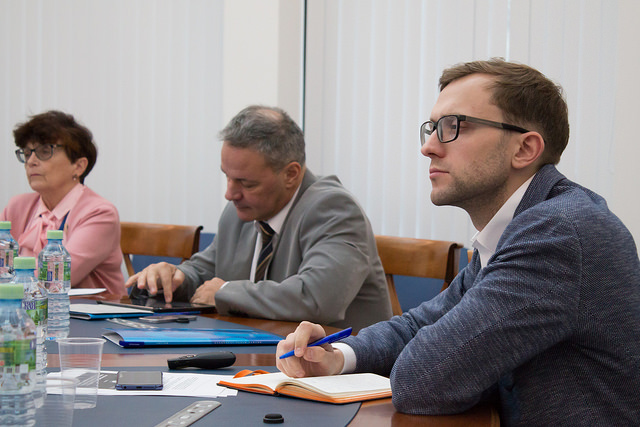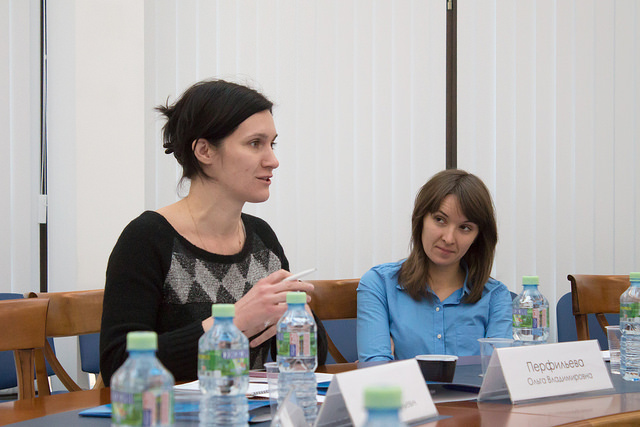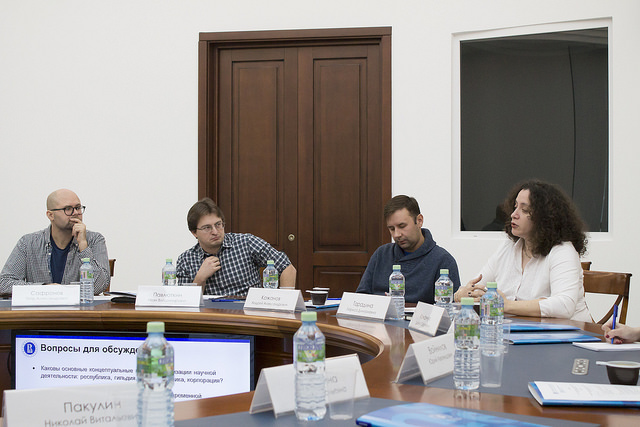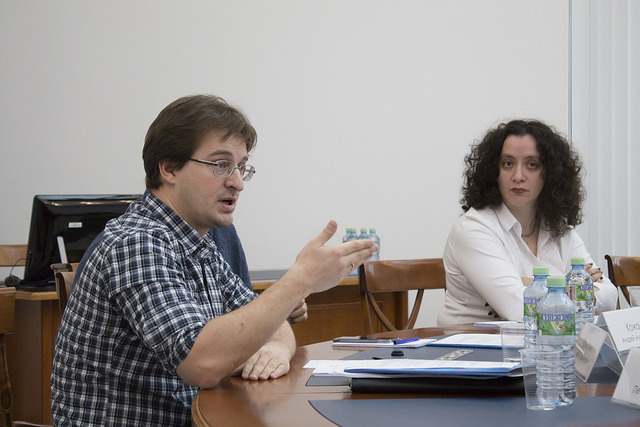Science Management Practices as a Study Object
On 8 December ISSEK hosted a discussion of best R&D and/or S&T management practices applied by academic organisations. Leading science, technology and education experts discussed conceptual models of R&D management, analysed various aspects of measuring academic organisations’ performance, and debated whether it would be at all possible to develop any universal success recipes.
Konstantin Fursov, Head of HSE ISSEK R&D Performance Analysis sector, presented a project “Setting up a Knowledge Network to Share Best R&D Management Practices and S&T Results, Based on Interdepartmental R&D and Educational Organisations Performance Monitoring System” commissioned by the RF Ministry of Education and Science, which ISSEK experts are currently implementing. Based on the project’s results a knowledge base will be created on the online platform of the Federal System for Monitoring and Assessment of R&D Organisations’ Performance (FSMA), to facilitate establishing “horizontal” links between such organisations to share experience and best practices and upgrade science managers’ qualifications and skills.
By now international experience was analysed in the scope of the project, reference groups assembled to assess organisations’ performance, and a typology of management practices designed. The top level of the typology comprises six groups: management structure, HR policy, infrastructure, financial management, communications and cooperation, and results management.
Currently a survey of academic organisations’ staff is under way, using the in-depth interviews technique. At the next stage, on the basis of the survey results, best management practices will be analysed and codified, and recommendations prepared for their application and removal of barriers hindering efficient R&D productivity management.

Tatiana Kuznetsova, Yury Simachev, Konstantin Fursov
The round table participants commented on the progress of the study and made suggestions. E.g. Yury Simachev, Chief Research Fellow at HSE ISSEK Foresight Centre, stressed that “worst” practices might also be worthy of notice, along with the best ones. The expert noted that international experience should be treated carefully, because specific environment plays a major role in implementation of management practices: “In some societies a particular practice works just fine, while in others it can degrade and transform into something quite different, leading to controversy and conflicts”.
Galina Kitova, Head of Department for Science Policy at HSE ISSEK, noted that best R&D management practices can be applied not just by academic organisations and universities but also by other kinds of R&D organisations, in particular relevant divisions of companies, including companies with public participation. According to the Federal Law “On Science and Government S&T Policy”, organisations performing R&D are considered as R&D organisations if their R&D and/or S&T activities are primary ones. Furthermore, R&D and other organisations performing R&D in Russia have quite different ownership formats (in most cases they are public and autonomous institutions; public unitary enterprises; public corporations, etc.). Since different legal models are applied for these and other formats, organisations’ actual opportunities to manage their R&D and/or S&T activities largely depend on their ownership status, among other things. Accordingly, when best management practices are identified and analysed, and recommendations on their replication are prepared, it should be kept in mind that such practices wouldn’t be applicable everywhere else by definition. E.g. a university or an R&D organisation supervised by the FASO wouldn’t always be able to borrow and apply management experience and practices accumulated by private companies. Therefore, though structured (in whatever way) information about best management practices would always have value, in Galina Kitova’s opinion various R&D organisation types’ opportunities to apply it should be take into account.

Olga Perfilyeva, Ekaterina Streltsova
Olga Perfilyeva, consultant at National Staff Training Foundation, offered an important recommendation suggesting that not just heads of R&D organisations should be interviewed (such conversations usually tend to be rather formal), but also researchers – heads of organisations’ divisions, e.g. in the focus group format. The expert also accentuated the need to analyse networks which bring together universities and R&D organisations, those belonging to the RAS and others.
Tatiana Kuznetsova, Director of HSE ISSEK Centre for S&T, Innovation and Information Policy, stressed that analysing best practices of organising and supporting R&D, and various stakeholders’ cooperation potential, it would be important to concentrate on actual practices, the real reasons, and existing limitations. This would allow to build more comprehensible and adequate hypotheses for application (and expert review) in the course of surveying R&D organisations and universities. She also pointed out problems with accessing certain organisations, and not just due to officially or unofficially confidential nature of their activities. There’s a quite high probability of organisations which did manage to achieve impressive results being unwilling to share their experience.

Petr Safronov, Ivan Pavlyutkin, Andrey Kozhanov, Larisa Taradina
“In terms of science management structure Russia is not a Western country, so we should take a look at other post-Soviet nations and their systems”, noted Andrey Kozhanov, Deputy Dean of the HSE Faculty of Social Sciences. And questioned suitability of the widely applied in Western countries peer review approach, which may not work in the context of Russian institutional system. According to the expert, productivity of the R&D sector as a whole should be distinguished from productivity of specific R&D organisations. However, even adoption of productivity criteria for specific organisations could cause problems: does absence of failures constitute a best practice, and a management success? Should managers’ productivity be assessed on the basis of streamlined work procedures, or measured by the organisation’s contribution to advancement of science? The expert also noted the importance of finding out about specific aspects of R&D organisations’ interaction with authorities.
Larisa Taradina, Supervisor of International University Leadership Programmes at the Russian Ministry of Education and Science, noted different strategies and goals pursued by universities: some of them have to comply with efficiency criteria and stay within quite strict limits imposed on them, while others employ their own development criteria. She also noted the differences between public and private universities, e.g. regarding funding sources. The nature of universities’ research is also very important: depending on whether a university is oriented towards applied research and, in most cases, obtaining quick results, or on the contrary towards basic studies where projects can take a very long time, efficiency criteria and management practices would be quite different.

Ivan Pavlyutkin, Larisa Taradina
Ivan Pavlyutkin, Senior Research Fellow at HSE Laboratory for Studies in Economic Sociology, spoke about university rankings where leaders usually tend to remain unchanged, but significant fluctuations can be observed in the middle and the lower sections quite frequently. Accordingly, the expert suggested various external circumstances should be taken into account, first of all availability of resources which determine the choice of management practices. Ivan pointed at such common in Russia phenomenon as mergers of organisations or their divisions, and noted it would be interesting to track down how it affects management practices.
Experts repeatedly stressed particular importance of indicators and practices linked with R&D organisations’ openness, and commercialisation of their R&D results. According to Petr Safronov, Associate Professor at HSE Institute of Education and the academic supervisor of the Evidence-based Educational Policy programme, application of standardised success recipes would now be possible only at global universities with transparent and permeable borders. He cited a metaphor of universities as “enterprises” or “businesses”, with households shipping the “product”, academic community processing it, and the labour market receiving it. In such model it’s particularly important to coordinate the interests of various stakeholder groups through efficient negotiations.
Ekaterina Streltsova, Junior Research Fellow at ISSEK Centre for Statistics and Monitoring of S&T and Innovation, spoke about the R&D sphere’s social contract: if research organisations’ and universities’ main goal used to be creating new knowledge, now producing socially or economically significant results is seen as equally important. Therefore, stressed Ekaterina, cooperation between R&D and other kinds of organisations becomes relevant, together with academic organisations’ positioning and development in other fields of life.
At the end of the round table discussion Konstantin Fursov thanked participants for their constructive contributions and suggested they should meet again in the new year to review new project results.
Text by Irina Agapova
